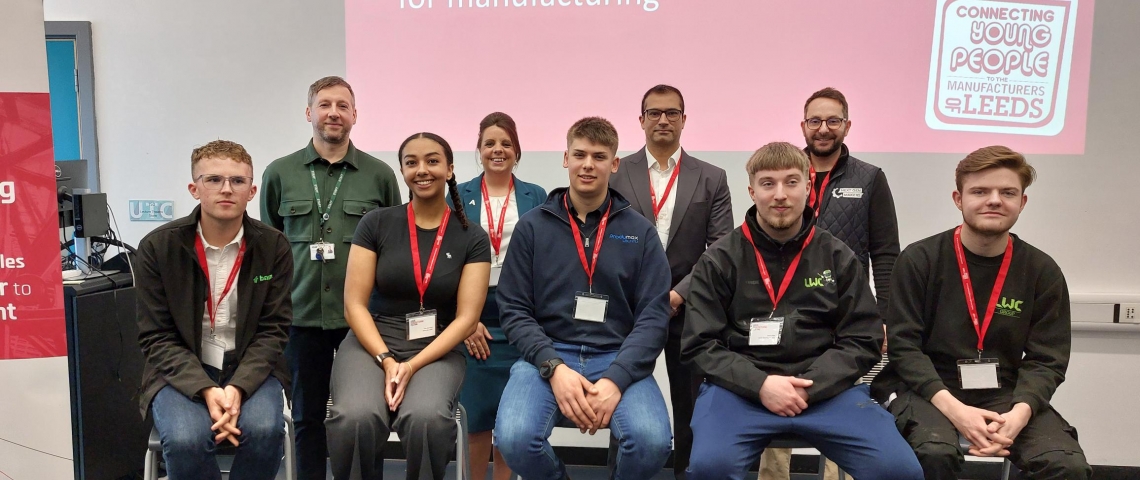

Employers, training providers and engineering students came together at UTC Leeds in April to learn how T levels and industry placements, which are a key part of the two-year qualification, can create a pathway for apprenticeship recruitment and how employers can adopt best practice to ensure apprentices successfully complete their training. They also heard from a panel of apprentices, who described their experience and what attracted them to careers in manufacturing and engineering.
________________________________________________________________________________________________________________________________________________
Combining classroom-based learning with a nine-week industry placement undertaken in year two of the qualification, T levels are the equivalent of three A levels and are designed to develop the knowledge, attitudes and practical skills young people need for the world of work.
“The whole idea of T levels is to create a talent pipeline for further study, apprenticeships and employment and central to that is giving young people hands-on, practical experience,” said Mandeep Sandhu, sector engagement lead for UK skills charity Enginuity. "Hosting placements can be a challenge for employers but the real issue is to understand how they can add value for employers and for employers themselves to then become champions for T levels.”
Neil Copsey, careers lead at UTC Leeds has seen how T levels have moved the needle when it comes to employability: “Employers were telling us that our students were academically gifted but didn’t have any experience.”
Industry placements, which are key to the qualification and can actually be split across a couple of employers, if necessary, give students the ability to translate classroom-based learning into real life situations. “Our collaboration with Appris has also helped identify ways in which T level learning units can be mapped against apprenticeship training to give accreditation of prior learning and potentially accelerate completion of an apprenticeship.”
Appris Management is the leading training provider in the region for engineering apprenticeships. Key to its success is a selection process designed to ensure employers get the right person when they recruit to an apprenticeship,
Director of delivery Nikita Seabright joined Appris after 16 years working for large manufacturing employers such as Cummins and Syngenta. She has seen first-hand how T levels, with the emphasis on practical experience and exposure to real workplace environments, mean employers are far more likely to recruit the right person to an apprentice role. “We work with over 170 employers in the region and have over 570 apprentices in learning. We’ve seen an 83% success rate for our apprentices compared to the national average which is just 60% and experience tells us there’s a much higher retention rate for staff who began as apprentices,”
Adam Tipper, managing director of Next Gen Makers, described T levels as a key part of an early careers strategy, helping to identify talent, reduce recruitment costs and develop workplace behaviour, as well as skills, with the result that students can be ‘role ready’ within 12 months
But once you’ve recruited an apprentice, how do you keep them?
Next Gen Makers runs a best practice network and quality assurance framework for apprenticeships. “We’re about helping employers be the best employers they can be because good employers treat people well and people stay with good employers.”
Leeds-based engineering firm LBBC is a member of the network recently achieved gold standard ‘Excellent Employer’ accreditation. “Clearly defined career pathways beyond an apprenticeship, together with structured support for individuals who show potential and willingness, were key things that stood out and helped the company achieve the award,” Adam said.
Drawing on experience of LBBC and employers across the country, Adam and his team have been able to benchmark what best-in-class apprenticeships and recruitment practice look like. “Members of our network offer factory tours, CPD opportunities for teaching staff, work experience for students and have apprentice ambassadors taking part in school careers talks. Some have set up their own recognition and awards programmes and one employer has gone as far as setting up a shadow board made up of apprentices.”
Apprentices share experience and insights
James Gardiner started with UTC Leeds when he was 14 and says the reason he originally went into manufacturing was because ‘it’s in the family’. Now working as a Higher CNC Machinist apprentice at aerospace components manufacturer Produmax, James says he enjoys the problem solving, variety and creativity his job involves.
Ellie Bamfield is also a former student at UTC Leeds, who works as an engineering graduate on the ‘Accelerating Women in Engineering’ programme with Mercedes-AMG. “I like the practical, hands-on nature of the job but also the job security. The demand for engineers means you will always have a job.”
Ethan Ridge said he didn’t know what he wanted to do when he left school. “I knew I wanted to do something practical but I definitely didn’t want to work at a desk.” Now working as an apprentice welder / fabricator with Leeds Welding Company, he’s found he loves the problem-solving nature of the job.
Colleague Toby Ashton says variety is important but also enjoys learning about something in depth: “Rotation suits my personality. You get to know something, learn to love it and then move on to something new.”
Oliver Rhodes works for civil engineering firm BAM Nuttall on the TransPennine route upgrade. He doesn’t feel as though he is missed out on something compared to friends who went to university after school. “As a degree apprentice I get to spend nine weeks a year at Leeds Beckett University on block learning with other students. I’m still able to enjoy the ‘student experience’ but I’m already earning a living.”